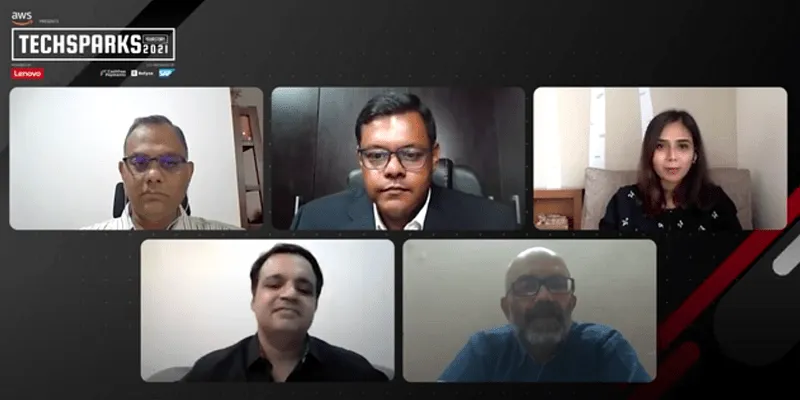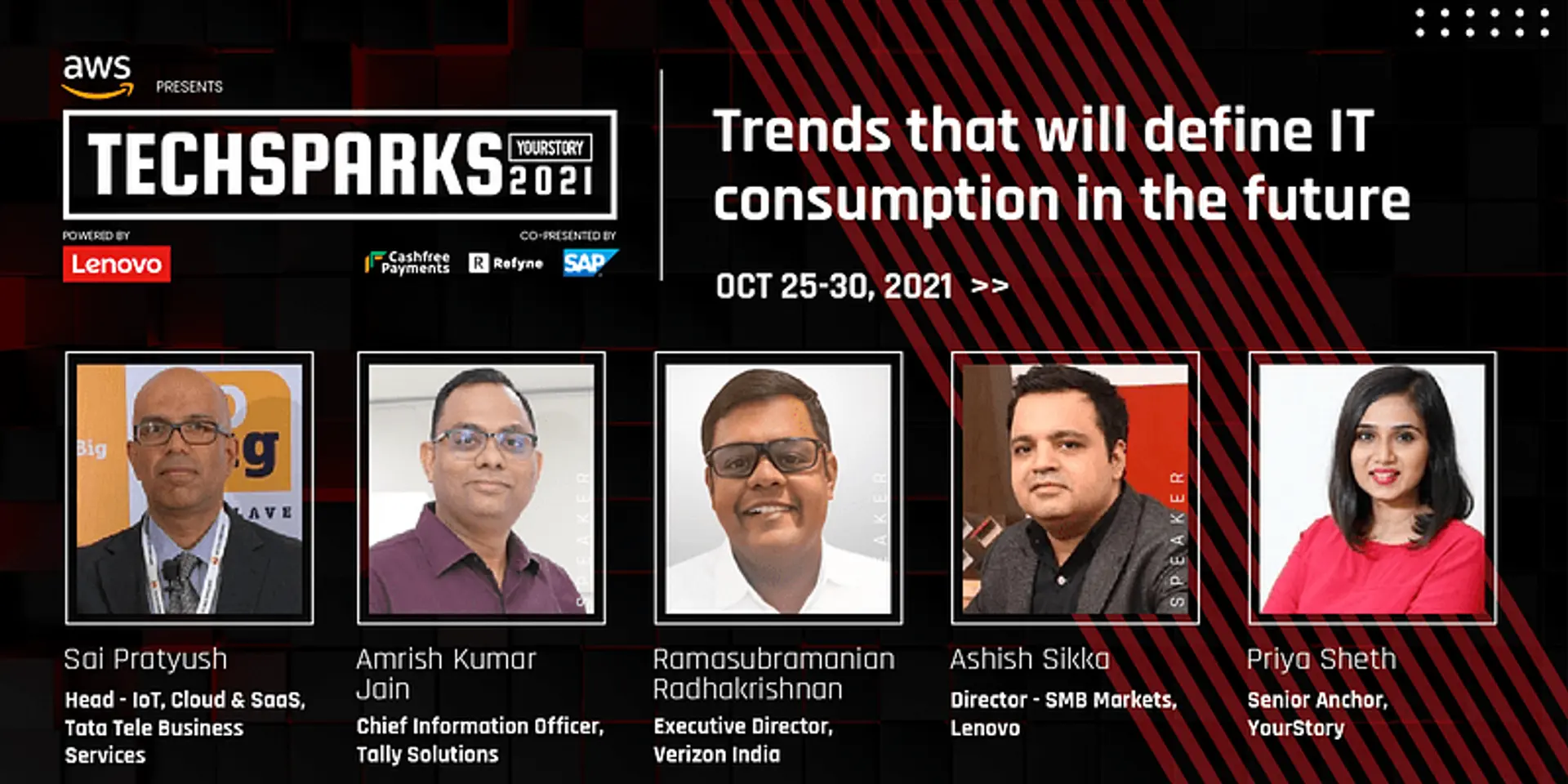The next normal: How India will consume IT in the future
Speaking at the 12th edition of YourStory’s flagship startup tech conference, TechSparks 2021, experts predicted the top technology trends to watch out for during a panel discussion on ‘Trends that will define IT consumption in the future’.
The past year has caused massive disruptions in the IT sector, with businesses across the globe accelerating their digital transformation initiatives at breakneck speeds. As we come to the end of 2021, it will be interesting to note which technology trends made the most impact in the past couple of years.
To shed light on the subject, TechSparks 2021 brought together experts like Sai Pratyush, Head - IoT, Cloud and SaaS, Tata Tele Business Services (TTBS); Amrish Kumar Jain, Chief Information Officer, Tally Solutions; Ramasubramanian Radhakrishnan (Rama), Executive Director, Verizon India and Ashish Sikka, Director - SMB Markets, Lenovo.

Journey to digital transformation
Organisations have grown by leaps and bounds due to their technological prowess. Three major trends, noted Ashish, were remote working, digitisation and automation.
Verizon’s Rama credits the pandemic as the primary force behind the digital transformation across industries. “For a lot of companies and large enterprises which were still dated in regards to their technology, digital became the front and centre. As far as customer experiences are concerned and everything around it - security, performance, ensuring that we build truly robust and scalable products and platforms for our customers - became essential in the last 18 months,” he explained.
Sai added that the primary responsibility at TTBS became helping customers continue their business operations as normally as possible. The pandemic also made them realise that office premises were no longer important and customers needed to operate from anywhere.
“It required us to tap into this change and bring in products and services which would enable customers to collaborate better. Customers realised that they needed to be digitally-savvy in order to survive and ensure business continuity,” he said.
Echoing similar sentiments, Amrish stated that small and medium enterprises (SMEs) realised the need for digitisation more than ever during the pandemic and to digitally connect with their customers and peers in the ecosystem.
“I think every organisation needs to explore digital automation and invest a substantial amount in it to stay relevant in the market. Automation of various platforms such as collaboration platforms, payments platforms, service platforms all need to come in together like a connected service. And that's what our focus has been, so that our customers, partners and employees can enhance their productivity,” he shared.
Tech trends shaping the future of consumption
Today, 83 percent of employees want to work in a hybrid environment, said Ashish. But with remote working, security, collaboration, and productivity are always a challenge.
“We have reimagined services for a hybrid model. Our Premium Support offers 24X7 kind of support to our customers on prioritisation so that downtime is minimised. When we talk about security, we have an offering called ThinkShield. And for collaboration, we have launched a complete line of laptops for SMBs so that they can get what their employees need in the form of looks and features,” he explained.
The Lenovo Device Intelligence gives proactive alerts to the IT Department or even to the user, in case something is going to go wrong with the machine. “So we are actually imagining the entire life cycle management of IT devices at the customer’s end and trying to see what more we can do so that customers can focus on their basic task while we take care of their IT requirements,” added Ashish.
One of the major trendsetters, according to Rama, has been 5G, which will redefine the way communication and industries function.
“It's indeed the start of the fourth industrial revolution with 5G at the front. Every large industry can set up its own private 5G network. The advent of compute to quantum compute is also going to be an industry trend for the future,” he said.
Another aspect will be explainable AI — one that refers to methods in the application of Artificial Intelligence in more understandable ways to humans.
Sai added that they have been working on IoT services, beyond the traditional telecom services. “We made investments in building our capabilities in the IoT and cloud computing space. We are partnering with Zoom to take their collaboration services into the market to SMEs. Another critical investment we are making is within Tata Tele Services in terms of making it easier for customers to buy from us to deal with us. So we are among the first telcos to invest in cloud services platforms,” he revealed.
Dealing with challenges
As every business has unique needs, leaders need to understand their requirements. “It is important to understand your way of working and then look towards effective and simple automation tools, which can have a seamless collaboration among your peers and your ecosystem. Until then, there will always be friction areas,” clarified Amrish.
The broad challenges every organisation faces are cash conservation, productivity, manageability and security. “When we are interacting with any business, we try to figure out which of these four the organisation is focusing on and then design the solution accordingly,” explained Ashish, adding, “For cash conversation, if people are looking at moving from a capex to an op-ex kind of a model, then Device-as-a-Service or Everything-as-a-Service is an option. When you talk about manageability, it is about having devices and a data centre that you can easily manage. Coming to security, our machines actually throw out security audits and inform people if the network they are on is not right for them. We customise the solutions according to each customer's requirement.”
While Rama believes upskilling and training employees have become critical today, Amrish added that how quickly teams are able to learn new skills and adapt to new environments are all going to be important to keep up with the changing ecosystem.
“You just cannot ask them to do one course. It has to be a continuous cyclic process where they keep on learning, improving, implementing and then learning new skills. For the technology providers, it will be equally important to see how simple and easy their solutions are, so that the learning curve is as less as possible for the end customer,” he said.
The way ahead
Beyond just focusing on pure telecom infrastructure that can help digital transformation alone, TTBS is also trying to move up the value chain by giving customers access to applications and cloud services for an easy transition.
“A majority of the SMEs in the country don't necessarily have the expertise that is required to enable digital transformation. And they're looking at partners to make this journey seamless. And we think we are well suited to support our customers,” said Sai.
One of the biggest catalysts for technology transformation has been the pandemic. Today, the need for premium technology has increased. “You want to have a machine which has a good screen resolution. You want to have a high-resolution camera. There was a time when we were talking about the death of the PC industry itself, or at least no growth rate for the future, because most of the things were moving on to smaller screen sizes. But people have realised that a larger screen size device has a role to play as you cannot spend 78 hours in front of a smaller screen size device,” said Ashish.
For Rama, the aim has been to reimagine the business through investments in technology, through 5G and superior customer service.
“The space we are in - anytime, anywhere access, along with the connected services, is one of the biggest areas where we are heavily investing, and we see that to be the future on the way we want to operate,” said Amrish.
To log in to our virtual events platform and experience TechSparks 2021 with thousands of other startup-tech enthusiasts from around the world, join here. Don't forget to tag #TechSparks2021 when you share your experience, learnings and favourite moments from TechSparks 2021.
For a line-up of all the action-packed sessions at YourStory's flagship startup-tech conference, check out TechSparks 2021 website.






